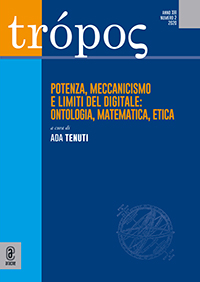Towards a Critique of Algorithmic Reason
DOI:
https://doi.org/10.13135/2036-542X/8105Abstract
Datification and predictions based on correlations suggest that data–driven procedures in social sciences are interested mainly in tracing the appearances. Big Data science seems to rely on predicting the appearance without taking into account the explanation and the existence of the phenomena. Following Husserl, Arendt and Stiegler it is legitimate to build abstraction criteria to extract data from the phenomena in order to make sense of them. However, it is necessary to be in control of what we are doing, and we need to check models against the effectiveness of the results in understanding phenomena. What happens when the process of abstraction happens in ways and with tools that nobody can check from outside? What happens when the results of the abstraction/technicization process have normative effects on its research objects, imposing expectations and predictions of people’s behaviour according to predictive analytics? Is data science moving beyond Modern Science as we know it? If phenomena under observation rely on uncertain circumstances, there is no way to make predictions that are completely trustworthy. But if the predictions have normative effects, we have to pay attention to the uncontrolled consequences of such a vicious circle.



